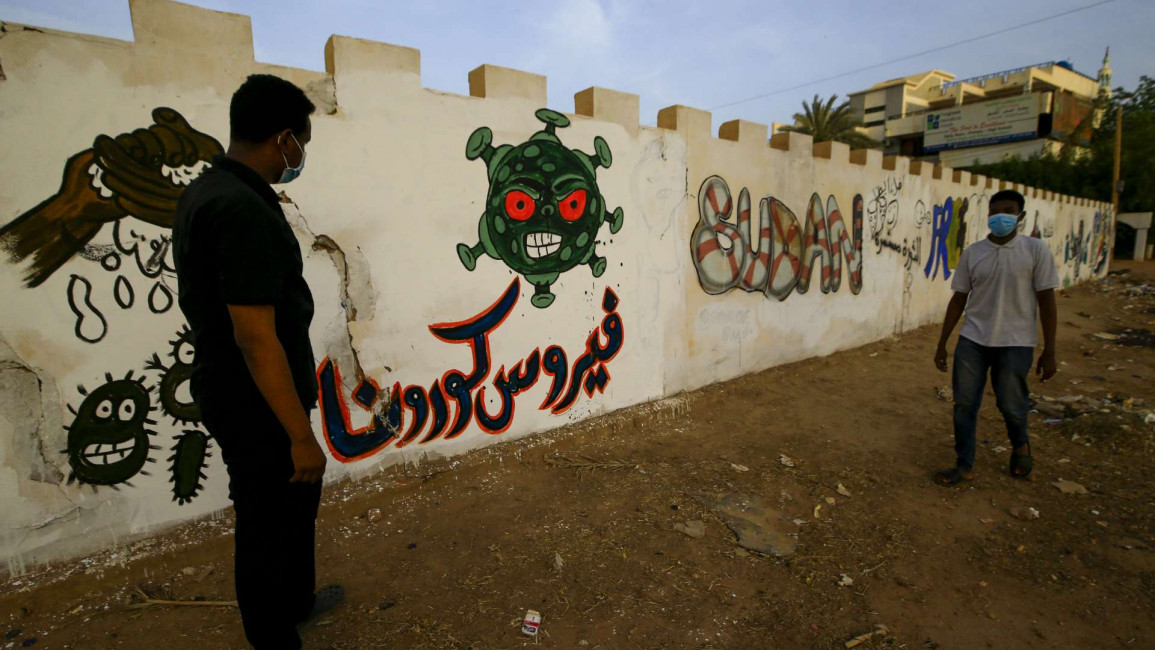Sudan to fall deeper into recession due to coronavirus pandemic, IMF says
Sudan to fall deeper into recession due to coronavirus pandemic, IMF says
Unemployment and inflation are set to rise due to the coronavirus pandemic, punishing already struggling Sudanese workers.
3 min read
Unemployment is set to rise this year, according to the IMF [Getty]
Sudan's fragile economy is set to fall further into recession this year, the International Monetary Fund (IMF) said on Tuesday, as citizens prepare to begin a three-week curfew to slow the spread of the novel coronavirus.
In its World Economic Outlook released on Tuesday, the IMF revised its 2020 growth forecasts for Sudan from -1.2 percent to -7.2 percent. The country's 2021 forecasts were also revised from -0.6 percent to -3.0 percent.
The dark predictions come one year after the Sudanese military ousted former dictator Omar Al-Bashir in a coup prompted by months of popular protest.
Poor economic conditions were one of a number of grievances that first pushed Sudanese demonstrators to the streets in December 2019.
Activists alleged widespread corruption and economic mismanagement, with ordinary Sudanese wracked by unemployment and high living costs.
Turning Sudan's battered economy around is a key goal for the transitional government formed in August last year but protesters complain change has been slow to materialise.
Khartoum continues to pursue international aid amid the coronavirus crisis, with its presence on the US State Sponsors of Terrorism list and disagreements over the removal of state subsidies posing difficulties.
Unemployment is expected to rise in 2020 to 25 percent from 22.1 percent last year, according to the IMF. The international body projected that unemployment will dip back to 2019 levels in 2021.
Sudan's Consumer Price Index (CPI) is also set to sharply increase from 51.0 percent last year to 81.3 percent this year - the highest in the entire Middle East and North Africa region. That indicates that Sudan's already sky-high inflation levels are set to rise further.
The CPI is projected to rise again to 91.1 percent in 2021.
Sudan has reported 32 coronavirus cases, including five deaths. All but one of those cases were in the nation's most populous state, Khartoum.
It is likely those numbers are just the tip of the iceberg. The country's ailing healthcare system lacks the supplies and equipment needed for widespread testing and the treatment required for the expected high number of Covid-19 cases.
"After the latest rise, we have now reached the stage of community spread... which is the beginning of a slide towards a wider outbreak of the disease," Health Minister Akram Ali al-Tom said on Monday.
Follow us on Facebook, Twitter and Instagram to stay connected
In its World Economic Outlook released on Tuesday, the IMF revised its 2020 growth forecasts for Sudan from -1.2 percent to -7.2 percent. The country's 2021 forecasts were also revised from -0.6 percent to -3.0 percent.
The dark predictions come one year after the Sudanese military ousted former dictator Omar Al-Bashir in a coup prompted by months of popular protest.
Poor economic conditions were one of a number of grievances that first pushed Sudanese demonstrators to the streets in December 2019.
Activists alleged widespread corruption and economic mismanagement, with ordinary Sudanese wracked by unemployment and high living costs.
Turning Sudan's battered economy around is a key goal for the transitional government formed in August last year but protesters complain change has been slow to materialise.
Khartoum continues to pursue international aid amid the coronavirus crisis, with its presence on the US State Sponsors of Terrorism list and disagreements over the removal of state subsidies posing difficulties.
Unemployment is expected to rise in 2020 to 25 percent from 22.1 percent last year, according to the IMF. The international body projected that unemployment will dip back to 2019 levels in 2021.
 |
| [Click to enlarge] |
Sudan's Consumer Price Index (CPI) is also set to sharply increase from 51.0 percent last year to 81.3 percent this year - the highest in the entire Middle East and North Africa region. That indicates that Sudan's already sky-high inflation levels are set to rise further.
The CPI is projected to rise again to 91.1 percent in 2021.
The IMF cautioned that its Tuesday forecasts are marked by "extreme uncertainty", meaning that actual outcomes could be far worse or better depending on the course of the pandemic.
Khartoum announced this week a three-week curfew to prevent the spread of the Covid-19 illness set to begin on Saturday.
The curfew will apply to Khartoum state, which includes the capital and its sister-city of Omdurman. People will still be allowed to move around their neighbourhoods to buy supplies during limited opening hours for grocery shops and pharmacies.
The curfew will apply to Khartoum state, which includes the capital and its sister-city of Omdurman. People will still be allowed to move around their neighbourhoods to buy supplies during limited opening hours for grocery shops and pharmacies.
Sudan has reported 32 coronavirus cases, including five deaths. All but one of those cases were in the nation's most populous state, Khartoum.
It is likely those numbers are just the tip of the iceberg. The country's ailing healthcare system lacks the supplies and equipment needed for widespread testing and the treatment required for the expected high number of Covid-19 cases.
"After the latest rise, we have now reached the stage of community spread... which is the beginning of a slide towards a wider outbreak of the disease," Health Minister Akram Ali al-Tom said on Monday.
Follow us on Facebook, Twitter and Instagram to stay connected



![South Sudan famine [AFP] South Sudan famine [AFP]](/sites/default/files/styles/image_212x120/public/media/images/5FED4B35-6177-43AD-844A-5C63373FCF89.jpg?h=d1cb525d&itok=K8KGEDoS)